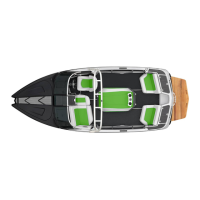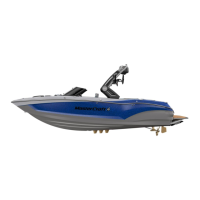2017 OWNERS MANUAL / 28
BOATING UNDER THE INFLUENCE
Boating under the influence of alcohol or drugs can be as deadly
as driving a car while under the influence!
Did you know:
• A boat operator is likely to become impaired more quickly than a
vehicle driver, drink for drink?
• The penalties for BUI can include large fines, revocation of oper-
ator privileges and serious jail time?
• The use of alcohol is involved in about one-third of all recreation-
al boating fatalities?
It is illegal to operate a boat while under the influence of alcohol or
drugs in every state. The Coast Guard also enforces a federal law
that prohibits BUI.
Alcohol aects judgment, vision, balance and coordination. These
impairments increase the likelihood of accidents afloat for both
boat operators and passengers. U.S. Coast Guard data shows that
in boating deaths involving alcohol use, over half the victims cap-
sized their boats and/or fell overboard.
Alcohol is even more hazardous on the water than on land. The
marine environment of motion, vibration, engine noise, sun, wind
and spray accelerate a drinker’s impairment. These stressors cause
fatigue that makes a boat operator’s coordination, judgment and
reaction time decline even faster when using alcohol.
LAW ENFORCEMENT
A vessel underway, when hailed by a Coast Guard vessel, is required
to heave to, or maneuver in such a manner that permits a boarding
ocer to come aboard.
Other federal, state and local law enforcement ocials may board
and examine a vessel. The Coast Guard may impose a civil penalty
up to $1,000 for failure to comply with equipment requirements;
failure to report a boating accident; or comply with other federal
regulations. Failure to comply with the Inland Navigation Rules Act
of 1980 can result in a civil penalty up to $5,000. Details of the Act
are available online or through the U.S. Coast Guard and the Coast
Guard Auxiliary.
OPERATOR’S LICENSE
Some states are implementing operator’s license requirements.
These requirements vary widely. Many states now have restrictions
regarding age. If you are operating in a location where minors are
allowed to operate the boat, careful supervision by an adult should
be the rule of thumb always. Whether operating a boat locally or in
a remote location, operators should annually verify with state and
local authorities regarding whether a license or training is required.
LEGAL
REQUIREMENTS

